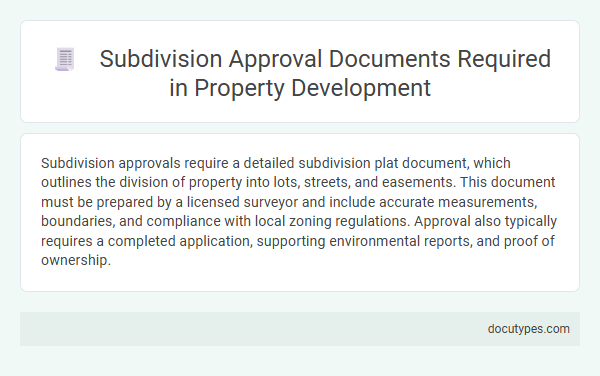Subdivision approvals require a detailed subdivision plat document, which outlines the division of property into lots, streets, and easements. This document must be prepared by a licensed surveyor and include accurate measurements, boundaries, and compliance with local zoning regulations. Approval also typically requires a completed application, supporting environmental reports, and proof of ownership.
Overview of Subdivision Approval in Property Development
What document is necessary for subdivision approvals in property development? The key document required is a subdivision application, which outlines the proposed division of land into separate lots. This application must comply with local government regulations and include detailed plans, environmental assessments, and any relevant permits to secure approval.
Key Documents Needed for Subdivision Applications
Key documents needed for subdivision applications include a detailed site plan, a surveyor's report, and an environmental impact assessment. These documents provide essential information about land boundaries, topography, and potential environmental concerns. You must submit these along with any local government forms to ensure your subdivision approval process moves smoothly.
Land Title and Ownership Proof
Land title documentation is essential for subdivision approvals as it verifies the legal ownership of the property in question. Proof of ownership, such as a registered deed or land certificate, must be submitted to demonstrate clear rights to the land. Local authorities require these documents to ensure compliance with zoning laws and to prevent disputes over land boundaries.
Site and Survey Plans
Site and survey plans are critical documents required for subdivision approvals. These plans provide detailed information on property boundaries, existing structures, and topographical features necessary for regulatory review.
- Site Plan - A detailed drawing illustrating the layout of the proposed subdivision including lot lines, building locations, roads, and utilities.
- Survey Plan - A precise measurement document prepared by a licensed surveyor showing exact property boundaries, dimensions, and any easements or encroachments.
- Importance for Approval - These documents ensure compliance with zoning laws, local ordinances, and environmental regulations, facilitating the subdivision approval process.
Zoning Certificates and Compliance Reports
Zoning certificates are essential documents required for subdivision approvals. They confirm that the proposed subdivision complies with local zoning laws and land use regulations.
Compliance reports provide detailed assessments verifying that the subdivision meets all relevant environmental and planning standards. These reports ensure adherence to municipal guidelines before final approval.
Environmental Impact Assessments
Environmental Impact Assessments (EIAs) play a critical role in subdivision approvals by evaluating potential effects on the surrounding environment. These assessments help ensure sustainable land use and compliance with regulatory standards during property development.
- Environmental Impact Assessment Report - A comprehensive document detailing the predicted environmental effects of the subdivision project.
- Baseline Environmental Data - Collected data on current environmental conditions to measure potential impacts accurately.
- Mitigation Plan - A strategy outlining measures to minimize negative environmental consequences from the development.
Securing approval for subdivision projects often hinges on submitting a satisfactory Environmental Impact Assessment to local planning authorities.
Engineering and Infrastructure Plans
Engineering and infrastructure plans are essential documents for subdivision approvals. These plans detail the design and layout of utilities, roads, drainage, and other critical infrastructure components.
Your submission must include precise engineering drawings that comply with local government standards. These plans ensure that the subdivision meets safety, environmental, and functional requirements. Properly prepared infrastructure plans facilitate a smooth approval process and protect long-term community interests.
Utility Connection Approvals
Utility connection approvals are essential documents required for subdivision approvals. These approvals confirm that utilities such as water, sewer, electricity, and gas can be safely and reliably connected to the new property parcels.
Securing utility connection permits ensures compliance with local regulations and prevents delays in the subdivision process. You must submit detailed plans and obtain approvals from each utility provider to move forward with your subdivision application.
Local Council Application Forms
| Document Type | Description | Purpose |
|---|---|---|
| Local Council Application Forms | Official forms provided by the local council required for submitting subdivision proposals. | To formally request subdivision approval and provide essential property details, plans, and compliance information. |
What Document Is Necessary for Subdivision Approvals? Infographic

